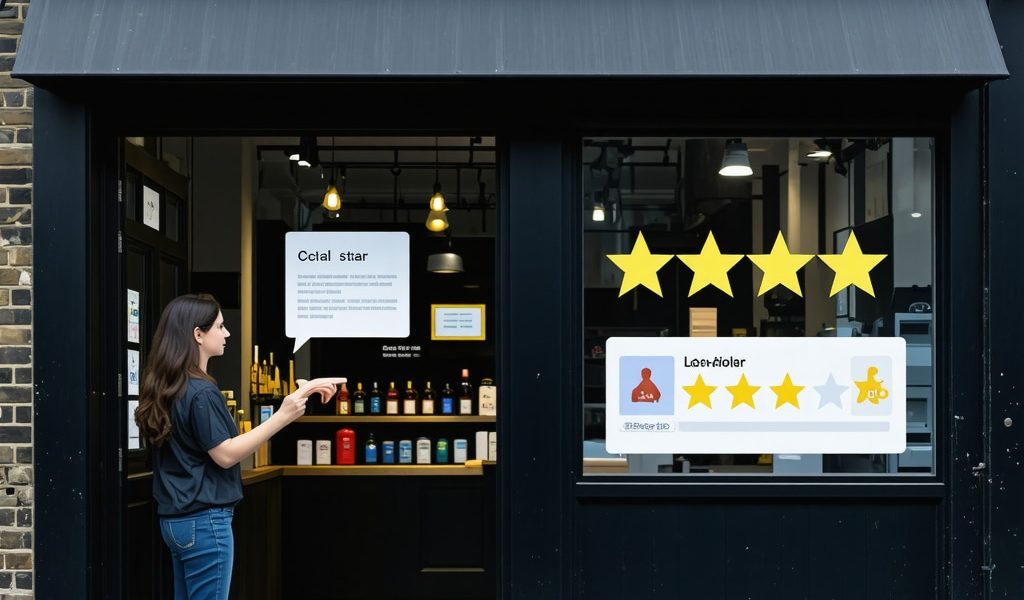Harnessing the Power of Authentic GMB Reviews: A Deep Dive into Local SEO Optimization
In the fiercely competitive landscape of local search, Google My Business (GMB) reviews emerge as a critical determinant of visibility and credibility. As an SEO expert, understanding the nuanced mechanisms by which reviews influence local rankings can unlock sustainable growth for small and medium enterprises. This article explores sophisticated techniques to generate genuine, high-quality reviews that enhance your local search performance.
Why Review Authenticity and Quality Are the Cornerstones of Local SEO Success
While quantity of reviews can sway perceptions, review quality and authenticity are paramount for establishing authority within Google’s local algorithm. Authentic reviews, especially those rich in relevant keywords and detailed experiences, serve as social proof and signal trustworthiness to search engines. According to Moz’s Local Search Ranking Factors, reviews account for a significant portion of local pack ranking signals, especially when they are diverse and recent (Moz, 2019).
The Complex Dynamics of Review Solicitation in a Competitive Environment
Effective review generation involves a strategic balance: incentivizing satisfied customers without violating Google’s review policies. Advanced practitioners leverage personalized outreach, automation tools, and timing optimization to encourage reviews from engaged customers. For instance, integrating review requests into post-service workflows enhances response rates without compromising authenticity. Additionally, crafting review prompts that subtly embed keywords related to your services can improve keyword relevance without sounding artificial.
What are the most effective ethical strategies for soliciting high-quality reviews in highly competitive local markets?
Answering this requires a nuanced understanding of customer psychology and Google’s guidelines. Best practices include providing exceptional service that naturally encourages positive feedback, and then requesting reviews through personalized messages—either via email or SMS—that emphasize the value of honest customer input. Using platforms like BrightLocal or GatherUp can streamline this process while maintaining compliance with Google’s policies. Furthermore, regularly monitoring and responding to reviews demonstrates active engagement, which search algorithms favor.
Leveraging Review Management Tools for Enhanced Credibility and Visibility
Modern review management tools play a pivotal role in orchestrating review generation campaigns. These tools enable systematic follow-up, sentiment analysis, and review request automation, leading to a steady influx of authentic feedback. A notable example is our expert citation services, which help amplify your review profiles across multiple local directories, reinforcing your authority.
Integrating Review Signals with Broader Local SEO Strategies
To maximize the impact of reviews, they should be integrated with comprehensive local SEO tactics such as local keyword optimization, citation building, and Google Maps SEO enhancements. Regularly updating your GMB profile, including photos and service descriptions, complements review efforts and signals to Google that your listing is active and authoritative.
In conclusion, generating high-quality GMB reviews requires an expert-level blend of ethical solicitation, strategic management, and holistic SEO integration. By adhering to best practices and leveraging advanced tools, local businesses can significantly enhance their visibility and credibility in search results.
For ongoing insights into local search optimization, explore our comprehensive guide to Google Business SEO or contact our specialists for tailored strategies.
Harnessing the Full Potential of GMB Reviews: Cutting-Edge Approaches for Local SEO Mastery
Building on foundational review management tactics, forward-thinking local businesses are now exploring innovative methods to leverage Google My Business reviews for superior search visibility. These strategies go beyond basic solicitation, emphasizing integration with broader digital marketing initiatives, data-driven optimization, and evolving Google algorithm nuances. As the local SEO landscape becomes increasingly competitive, understanding these advanced techniques is essential for sustained growth and dominance.
How Can Data Analytics Elevate Your Review Strategy?
Utilizing sophisticated analytics tools enables businesses to identify review patterns, sentiment trends, and customer feedback hotspots. For example, sentiment analysis can reveal recurring themes in reviews—highlighting strengths or uncovering service gaps that need addressing. Integrating these insights into your SEO efforts, such as refining your service descriptions or targeted keywords, can amplify your relevance. Platforms like local SEO analytics tools facilitate this process, transforming raw review data into actionable tactics that boost your rankings.
What are the most effective ways to harness review sentiment data for SEO enhancement?
Deep analysis of review sentiment allows for targeted keyword incorporation, improved service descriptions, and strategic content creation aligned with customer language. This approach ensures your GMB profile resonates authentically with your audience and search engines alike, enhancing relevance and trustworthiness. For a comprehensive guide on optimizing your GMB content, consult our tips for optimizing Google Business descriptions.
Integrating Review Generation with Voice Search Optimization
Emerging voice search trends demand that reviews be optimized for conversational queries. Incorporating natural language, long-tail keywords, and local dialects into review prompts can make feedback more voice-search friendly. For instance, encouraging customers to describe their experience as if speaking to a friend leverages the increasing prevalence of voice assistants like Siri and Google Assistant. This alignment with voice search patterns can significantly increase your chances of appearing in voice-driven local searches, providing a competitive edge in your niche.
To stay ahead, consider combining voice search tactics with your review management efforts by incorporating voice-optimized keywords into your review prompts and responses. For practical implementation, explore our content update strategies for local search visibility.
The Role of Google’s E-A-T Principles in Review-Based SEO
In recent algorithm updates, Google’s emphasis on Expertise, Authority, and Trustworthiness (E-A-T) underscores the importance of authentic, high-quality reviews. Reviews that demonstrate genuine customer experiences and include relevant keywords bolster your business’s perceived authority. Moreover, consistent engagement with reviews—responding thoughtfully and promptly—further signals active management and credibility to both users and search engines.
According to industry expert Marie Haynes, aligning review strategies with Google’s E-A-T principles is crucial for long-term visibility. Her insights into maintaining high standards of review authenticity and leveraging reviews to demonstrate expertise can be found in her authoritative SEO analyses (Moz, 2019).
Engage with your reviews regularly, respond authentically, and incorporate relevant keywords naturally to reinforce your authority. For a tailored approach, reach out to our expert team for personalized strategies that align with your local SEO goals.
We invite you to share your experiences with advanced review strategies or suggest other innovative tactics in the comments. For more insights into local SEO mastery, explore our comprehensive guide to Google Business SEO and stay ahead of the competition.
Harnessing the Power of Review Data Integration for Hyper-Targeted Local SEO Campaigns
In the realm of sophisticated local SEO, merely collecting reviews is no longer sufficient. Instead, integrating review sentiment and thematic data into your broader marketing analytics allows for hyper-targeted optimization. By leveraging tools such as Rasa NLU or MonkeyLearn, businesses can parse reviews for nuanced insights—identifying specific service strengths or recurring pain points. This granular understanding facilitates the creation of highly relevant content, tailored service offerings, and localized advertising that resonate deeply with your audience, ultimately boosting your Google My Business ranking and conversion rates.
How can sentiment analysis be integrated into local keyword strategy to boost GMB rankings?
Sentiment analysis helps identify the emotional tone behind customer feedback, revealing which aspects of your service evoke positive responses. Incorporating these themes into your local keyword strategy—by optimizing service descriptions, FAQs, and blog content—ensures your GMB profile captures the language and intent of your target market. For example, if reviews frequently mention “fast response” or “friendly staff,” embedding these phrases naturally into your profile and posts enhances relevance for voice searches and long-tail queries, aligning with Google’s focus on user intent and context.
Innovative Review Optimization Techniques for Voice Search and AI Assistants
With the rise of voice-activated devices, optimizing reviews for voice search has become a frontier of competitive local SEO. Advanced tactics include training your review prompts to elicit natural, conversational language that mirrors typical voice queries. For instance, encouraging customers to describe their experience as if speaking to a friend—”I loved how quickly they fixed my car”—aligns with Google’s evolving understanding of natural language processing. Additionally, integrating schema markup that highlights review snippets can improve the likelihood of voice assistants reading your positive feedback aloud, thereby increasing your brand’s visibility in voice-driven local searches.

What are the technical SEO considerations when implementing schema markup for review snippets?
Implementing schema markup for reviews involves adhering to Google’s structured data guidelines to ensure your snippets display correctly in search results. Use JSON-LD format for maximum compatibility and include detailed properties such as “reviewRating,” “author,” “datePublished,” and “reviewBody.” Proper schema implementation not only enhances visibility with rich snippets but also signals to Google that your review content is authoritative and trustworthy—crucial factors under the E-A-T framework. Regular validation through tools like Google’s Rich Results Test is essential to maintain compliance and effectiveness.
Future-Proofing Your Review Strategy Against Algorithm Shifts
As Google continues to refine its local ranking algorithms, reliance solely on review volume and ratings becomes risky. Instead, building a future-proof strategy involves fostering a community of engaged, loyal customers who contribute authentic, detailed reviews over time. Encouraging multimedia reviews—photos, videos, and long-form testimonials—can further diversify your profile and demonstrate genuine customer engagement. Moreover, integrating your review management system with CRM platforms allows for personalized outreach, nurturing long-term relationships that naturally generate ongoing, high-quality feedback.
Stay ahead of the curve by regularly updating your review solicitation tactics based on algorithmic changes and emerging trends. For instance, adapting to the increasing importance of user-generated content in local SEO means embracing new formats and platforms, such as video reviews on TikTok or Instagram stories, which can be repurposed for your GMB profile.
Interested in mastering these advanced review strategies? Consult with our SEO specialists to develop a tailored plan that leverages cutting-edge data integration, schema markup, and multimedia engagement to elevate your local SEO dominance. Contact us today for a comprehensive review optimization consultation and propel your business toward unrivaled visibility.
Harnessing the Power of Authentic GMB Reviews: A Deep Dive into Local SEO Optimization
In the fiercely competitive landscape of local search, Google My Business (GMB) reviews emerge as a critical determinant of visibility and credibility. As an SEO expert, understanding the nuanced mechanisms by which reviews influence local rankings can unlock sustainable growth for small and medium enterprises. This article explores sophisticated techniques to generate genuine, high-quality reviews that enhance your local search performance.
Why Review Authenticity and Quality Are the Cornerstones of Local SEO Success
While quantity of reviews can sway perceptions, review quality and authenticity are paramount for establishing authority within Google’s local algorithm. Authentic reviews, especially those rich in relevant keywords and detailed experiences, serve as social proof and signal trustworthiness to search engines. According to Moz’s Local Search Ranking Factors, reviews account for a significant portion of local pack ranking signals, especially when they are diverse and recent (Moz, 2019).
The Complex Dynamics of Review Solicitation in a Competitive Environment
Effective review generation involves a strategic balance: incentivizing satisfied customers without violating Google’s review policies. Advanced practitioners leverage personalized outreach, automation tools, and timing optimization to encourage reviews from engaged customers. For instance, integrating review requests into post-service workflows enhances response rates without compromising authenticity. Additionally, crafting review prompts that subtly embed keywords related to your services can improve keyword relevance without sounding artificial.
What are the most effective ethical strategies for soliciting high-quality reviews in highly competitive local markets?
Answering this requires a nuanced understanding of customer psychology and Google’s guidelines. Best practices include providing exceptional service that naturally encourages positive feedback, and then requesting reviews through personalized messages—either via email or SMS—that emphasize the value of honest customer input. Using platforms like BrightLocal or GatherUp can streamline this process while maintaining compliance with Google’s policies. Furthermore, regularly monitoring and responding to reviews demonstrates active engagement, which search algorithms favor.
Leveraging Review Management Tools for Enhanced Credibility and Visibility
Modern review management tools play a pivotal role in orchestrating review generation campaigns. These tools enable systematic follow-up, sentiment analysis, and review request automation, leading to a steady influx of authentic feedback. A notable example is our expert citation services, which help amplify your review profiles across multiple local directories, reinforcing your authority.
Integrating Review Signals with Broader Local SEO Strategies
To maximize the impact of reviews, they should be integrated with comprehensive local SEO tactics such as local keyword optimization, citation building, and Google Maps SEO enhancements. Regularly updating your GMB profile, including photos and service descriptions, complements review efforts and signals to Google that your listing is active and authoritative.
In conclusion, generating high-quality GMB reviews requires an expert-level blend of ethical solicitation, strategic management, and holistic SEO integration. By adhering to best practices and leveraging advanced tools, local businesses can significantly enhance their visibility and credibility in search results.
For ongoing insights into local search optimization, explore our comprehensive guide to Google Business SEO or contact our specialists for tailored strategies.
Harnessing the Full Potential of GMB Reviews: Cutting-Edge Approaches for Local SEO Mastery
Building on foundational review management tactics, forward-thinking local businesses are now exploring innovative methods to leverage Google My Business reviews for superior search visibility. These strategies go beyond basic solicitation, emphasizing integration with broader digital marketing initiatives, data-driven optimization, and evolving Google algorithm nuances. As the local SEO landscape becomes increasingly competitive, understanding these advanced techniques is essential for sustained growth and dominance.
How Can Data Analytics Elevate Your Review Strategy?
Utilizing sophisticated analytics tools enables businesses to identify review patterns, sentiment trends, and customer feedback hotspots. For example, sentiment analysis can reveal recurring themes in reviews—highlighting strengths or uncovering service gaps that need addressing. Integrating these insights into your SEO efforts, such as refining your service descriptions or targeted keywords, can amplify your relevance. Platforms like local SEO analytics tools facilitate this process, transforming raw review data into actionable tactics that boost your rankings.
What are the most effective ways to harness review sentiment data for SEO enhancement?
Deep analysis of review sentiment allows for targeted keyword incorporation, improved service descriptions, and strategic content creation aligned with customer language. This approach ensures your GMB profile resonates authentically with your audience and search engines alike, enhancing relevance and trustworthiness. For a comprehensive guide on optimizing your GMB content, consult our tips for optimizing Google Business descriptions.
Integrating Review Generation with Voice Search Optimization
Emerging voice search trends demand that reviews be optimized for conversational queries. Incorporating natural language, long-tail keywords, and local dialects into review prompts can make feedback more voice-search friendly. For instance, encouraging customers to describe their experience as if speaking to a friend leverages the increasing prevalence of voice assistants like Siri and Google Assistant. This alignment with voice search patterns can significantly increase your chances of appearing in voice-driven local searches, providing a competitive edge in your niche.
To stay ahead, consider combining voice search tactics with your review management efforts by incorporating voice-optimized keywords into your review prompts and responses. For practical implementation, explore our content update strategies for local search visibility.
The Role of Google’s E-A-T Principles in Review-Based SEO
In recent algorithm updates, Google’s emphasis on Expertise, Authority, and Trustworthiness (E-A-T) underscores the importance of authentic, high-quality reviews. Reviews that demonstrate genuine customer experiences and include relevant keywords bolster your business’s perceived authority. Moreover, consistent engagement with reviews—responding thoughtfully and promptly—further signals active management and credibility to both users and search engines.
According to industry expert Marie Haynes, aligning review strategies with Google’s E-A-T principles is crucial for long-term visibility. Her insights into maintaining high standards of review authenticity and leveraging reviews to demonstrate expertise can be found in her authoritative SEO analyses (Moz, 2019).
Engage with your reviews regularly, respond authentically, and incorporate relevant keywords naturally to reinforce your authority. For a tailored approach, reach out to our expert team for personalized strategies that align with your local SEO goals.
We invite you to share your experiences with advanced review strategies or suggest other innovative tactics in the comments. For more insights into local SEO mastery, explore our comprehensive guide to Google Business SEO and stay ahead of the competition.
Harnessing the Power of Review Data Integration for Hyper-Targeted Local SEO Campaigns
In the realm of sophisticated local SEO, merely collecting reviews is no longer sufficient. Instead, integrating review sentiment and thematic data into your broader marketing analytics allows for hyper-targeted optimization. By leveraging tools such as Rasa NLU or MonkeyLearn, businesses can parse reviews for nuanced insights—identifying specific service strengths or recurring pain points. This granular understanding facilitates the creation of highly relevant content, tailored service offerings, and localized advertising that resonate deeply with your audience, ultimately boosting your Google My Business ranking and conversion rates.
How can sentiment analysis be integrated into local keyword strategy to boost GMB rankings?
Sentiment analysis helps identify the emotional tone behind customer feedback, revealing which aspects of your service evoke positive responses. Incorporating these themes into your local keyword strategy—by optimizing service descriptions, FAQs, and blog content—ensures your GMB profile captures the language and intent of your target market. For example, if reviews frequently mention “fast response” or “friendly staff,” embedding these phrases naturally into your profile and posts enhances relevance for voice searches and long-tail queries, aligning with Google’s focus on user intent and context.
Innovative Review Optimization Techniques for Voice Search and AI Assistants
With the rise of voice-activated devices, optimizing reviews for voice search has become a frontier of competitive local SEO. Advanced tactics include training your review prompts to elicit natural, conversational language that mirrors typical voice queries. For instance, encouraging customers to describe their experience as if speaking to a friend—”I loved how quickly they fixed my car”—aligns with Google’s evolving understanding of natural language processing. Additionally, integrating schema markup that highlights review snippets can improve the likelihood of voice assistants reading your positive feedback aloud, thereby increasing your brand’s visibility in voice-driven local searches.
What are the technical SEO considerations when implementing schema markup for review snippets?
Implementing schema markup for reviews involves adhering to Google’s structured data guidelines to ensure your snippets display correctly in search results. Use JSON-LD format for maximum compatibility and include detailed properties such as “reviewRating,” “author,” “datePublished,” and “reviewBody.” Proper schema implementation not only enhances visibility with rich snippets but also signals to Google that your review content is authoritative and trustworthy—crucial factors under the E-A-T framework. Regular validation through tools like Google’s Rich Results Test is essential to maintain compliance and effectiveness.
Future-Proofing Your Review Strategy Against Algorithm Shifts
As Google continues to refine its local ranking algorithms, reliance solely on review volume and ratings becomes risky. Instead, building a future-proof strategy involves fostering a community of engaged, loyal customers who contribute authentic, detailed reviews over time. Encouraging multimedia reviews—photos, videos, and long-form testimonials—can further diversify your profile and demonstrate genuine customer engagement. Moreover, integrating your review management system with CRM platforms allows for personalized outreach, nurturing long-term relationships that naturally generate ongoing, high-quality feedback.
Stay ahead of the curve by regularly updating your review solicitation tactics based on algorithmic changes and emerging trends. For instance, adapting to the increasing importance of user-generated content in local SEO means embracing new formats and platforms, such as video reviews on TikTok or Instagram stories, which can be repurposed for your GMB profile.
Interested in mastering these advanced review strategies? Consult with our SEO specialists to develop a tailored plan that leverages cutting-edge data integration, schema markup, and multimedia engagement to elevate your local SEO dominance. Contact us today for a comprehensive review optimization consultation and propel your business toward unrivaled visibility.
Expert Insights & Advanced Considerations
1. Prioritize Authenticity Over Quantity
In the competitive landscape of local SEO, authentic reviews that genuinely reflect customer experiences significantly outperform sheer volume. Search engines and users alike value detailed, honest feedback that demonstrates real engagement, reinforcing your business’s credibility and authority.
2. Integrate Review Data with Broader SEO Tactics
Leverage sentiment analysis and thematic review insights to refine your local keyword strategy. This data-driven approach enables more targeted content creation and service enhancements, aligning your online presence with actual customer perceptions and improving your GMB ranking.
3. Optimize for Voice Search and AI Assistants
As voice search grows, adapting review prompts to elicit natural, conversational feedback is crucial. Incorporate long-tail, locally nuanced keywords in your review requests to enhance visibility in voice-driven local searches, gaining a competitive edge.
4. Utilize Advanced Schema Markup
Implement structured data with JSON-LD schema to highlight review snippets in search results. Proper schema use not only improves rich snippet visibility but also signals to Google that your reviews are authoritative and trustworthy, aligning with E-A-T principles.
5. Foster Community and Multimedia Engagement
Encourage multimedia reviews—photos, videos, and long-form testimonials—to diversify your profile. Building a community of engaged customers who contribute rich, varied content helps future-proof your strategy against algorithm shifts and sustains high local rankings.
Curated Expert Resources
- Moz Local Search Ranking Factors: Offers in-depth analysis of factors influencing local search, emphasizing review quality and diversity.
- BrightLocal’s Review Management Platform: Provides tools for ethical review solicitation, monitoring, and response management, ensuring compliance and authenticity.
- Google’s Structured Data Guidelines: Essential for implementing schema markup effectively, enhancing visibility and click-through rates.
- Marie Haynes’ SEO Analyses: Expert insights on E-A-T integration and review authenticity strategies.
- Rasa NLU & MonkeyLearn: Advanced tools for sentiment analysis and thematic review parsing, enabling data-driven SEO refinement.
Final Expert Perspective
In the realm of local SEO, mastering the art of generating authentic, high-quality GMB reviews is indispensable for establishing authority and outranking competitors. Integrating these reviews with sophisticated data analysis, schema markup, and voice search optimization elevates your strategy from basic to cutting-edge. For those committed to sustained growth, embracing these advanced techniques—while continuously monitoring industry trends—will position your business as a local authority. Engage with our team through our consultation services to craft a tailored, future-proof review strategy that maximizes your local visibility and credibility.



